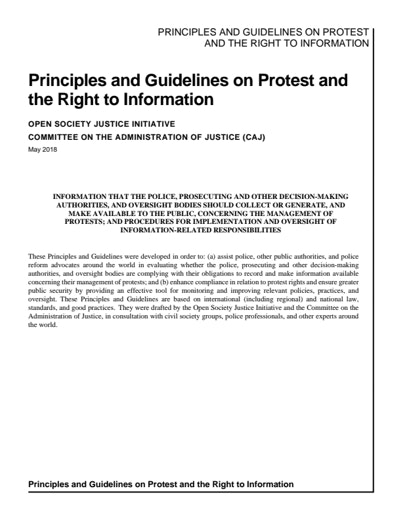Principles and Guidelines on Protest and the Right to Information
Protests are a catalyst for social change, and are essential for citizen participation in a pluralistic democracy. They enable individuals and groups to share their views and interests, express dissent, and make demands of government or other institutions. However, some police and government officials treat protests as an inconvenience, a disruption to be controlled, or a threat to be extinguished. Protecting against arbitrary or discriminatory treatment of protests, training police officers to properly manage protests, and monitoring the use of force during demonstrations are some of the challenges faced by societies in ensuring the right to assemble.
Sharing information on protest management benefits the police, decision-making authorities, and people participating in and monitoring protests, and helps guarantee the right to freedom of assembly. The Principles and Guidelines on Protest and the Right to Information are intended to improve security and assembly polices, help monitor compliance with existing rules, and create the basic conditions for accountability. By defining the categories of information that should be produced and made public concerning the management of protests, the Principles and Guidelines on Protest and the Right to Information promote greater understanding between police and protesters and safeguard freedom of assembly.
The Principles and Guidelines are based on international and regional law and standards relating to professional policing and the rights to freedom of expression, assembly, association, public participation, and access to information held by public authorities. They were drafted by the Justice Initiative and the Committee on the Administration of Justice, in consultation with civil society groups, police professionals, and other experts, and by Special Rapporteurs from the United Nations and the Inter-American Commission on Human Rights. They are intended for police forces, public officials, civil society, and protesters around the world.
